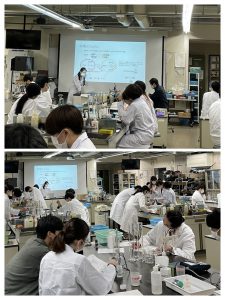Participation in CRSP-CEDA at Harvard Medical School
Three undergraduate students at TMU took part in Cell Biology Research Scholars Program (CRSP), an eight-week online workshop in experimental design held by Harvard Medical School this summer. Below are their comments.
Q1. What did you learn in this course? How were the contents?
- In this course, I learned how to write a research proposal from the overall structure to the things that should be considered in each section. The course included not only lectures but also group discussions in group of three, so this style of lectures helped me a lot to understand the contents actively. Based on the experience of writing experimental plans in Biological Experimental Course and Independent Research Course at TMU, the CEDA course gave me an opportunity to review the points that I had not considered in my previous experimental design, and I was able to understand how to improve them. (Y.A)
- I learned the methodology of science through the course, which researchers sometimes take for granted but is fundamentally important. I grasped the content by reading a book and actual research paper and also discussing it with folks from the U.S. and Puerto Rico. (K.Y)
- I identified the knowledge gap in the field of my interest using the information gained by reading theses. Then, I made a research plan to fill the identified knowledge gap and write a research proposal. Finally, I made a research presentation to make teachers and other students understand my research proposal. In addition, I learned many important things to conduct research and experiments, such as how to validate the experimental systems, write a grant research proposal, and make a good research presentation from twice-a-week lectures. (I.H)
Q2. What did you choose as your research theme?
- My research theme was " How Mosses Influence the Establishment of Aster kantoensis along the Banks of Three Rivers in Kanto Area." I have been interested in Aster kantoensis and have been used it as a subject of my experiment in Independent Research Course. Therefore, I wanted to take this opportunity to create a detailed research proposal of this flower, so I decided to set a research theme for the CEDA course as well. (Y.A)
- I chose to research the biological mechanisms behind human political behavior. That is because politics has been a significant "game-maker" in people's lives, and I am keen to improve current states using my favorite tool, biology. (K.Y)
- “The potential role of vitamin D in preventing type 2 diabetes through accelerating the glucose uptake into skeletal muscle” (I.H)
Q3. What was the most interesting about this course?
- Of course, the content of the lectures and discussions, but I was particularly impressed by the attitudes of the students participating from other countries during the discussions and presentations. In the discussions and presentations in the English program at TMU, I have the impression that students tend to hesitate to give opinions during discussions and to ask questions in presentations. However, in the CEDA course, there were many situations in which participants actively add some comments or ask further questions, expanding the topics. I was very inspired by those attitudes. (Y.A)
- What clicked with me was that researchers' intentions can make an experimental system either unreliable or solid. Then, even if the outcomes are the same, a solid system can make it more objectively valuable, and that is probably what researchers are supposed to do. (K.Y)
- Identifying the knowledge gap and finding a meaningful and feasible research theme were most interesting for me. Before taking this course, I had never experienced finding a research theme using the information gained by the theses. Although I was good at understanding the contents of the theses, it was not enough to find a meaningful and feasible research theme. Therefore, I had difficulty finding a research theme and had read more than 50 theses by the time I could find my research theme. This experience improved the thesis interpretation ability and the capacity to ponder research plans by connecting much existing information gained by the theses. (I.H)
Q4. Any comment?
- When I decided to participate in this online course, I was worried about whether I would be able to follow the content of the lectures, but with the support of the teachers, I feel that I was able to have a very valuable experience during this eight-week program. In fact, what I learned about designing an experiment through this course was put into practical use in my third-year seaside training. I can confidently say that what we can learn in the CEDA course will help us in future research activities, so I highly recommend to join this course if you are interested in this! (Y.A)
- I appreciated this chance to have a network of people I can depend on when facing difficulties in my career and research. (K.Y)
- Since I was a sophomore, I have been thinking that I want to be a researcher in the future. When I learned about this course, I felt it would be an excellent opportunity to learn how to be a researcher. This made me decide to take this course. After completing this course, I could feel my improvements and thought taking this course was an excellent decision for me. (I.H)


